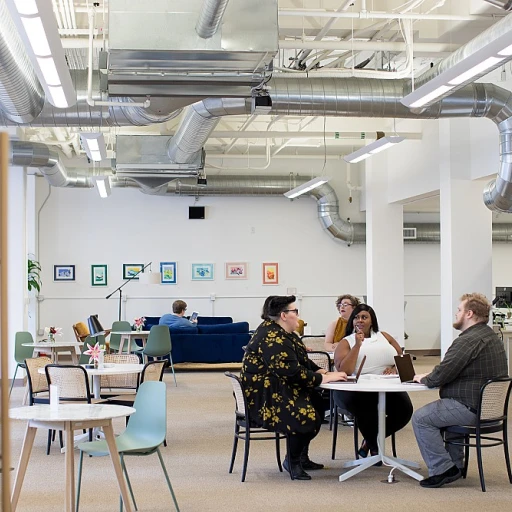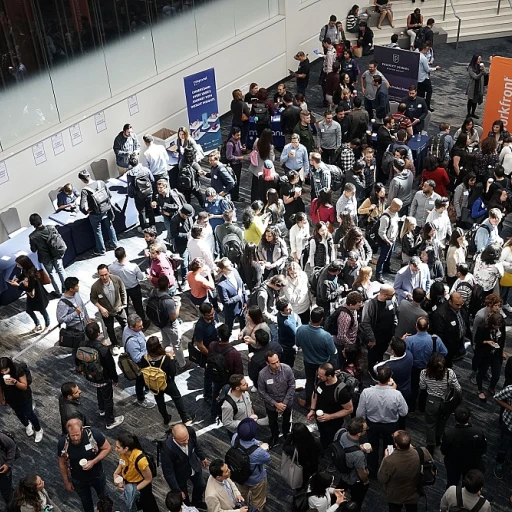
Understanding Candidate Experience
Comprehending the Dynamics of Candidate Experience
Understanding candidate experience is essential when exploring opportunities within any company, including Zestos. The candidate experience encompasses every interaction an individual has with an organization during the recruitment journey, from the initial job search to the final onboarding process. It plays a crucial role in shaping a candidate's perception of the company. In today's world, with multiple locations like Omaha, Nebraska, and South Carolina, companies need to ensure a consistent and positive experience for candidates. This doesn't just apply to niche players like Zestos, best known for its ice cream and food beverages. Industry-specific nuances, whether you're serving up soft serve inside a cozy shop or operating a large food chain, must be considered. The significance of the candidate experience has been increasingly recognized due to the growing competition for top talent. The integration of personalized elements and thoughtful feedback mechanisms further enhances these experiences, fostering a more engaging recruitment process. Meanwhile, technological advancements have drastically transformed how candidates interact with potential employers. Reputable companies like Zestos, with a proud history intertwined with events like the College Series at Rosenblatt Stadium in Atlanta, know that an exceptional candidate experience can significantly impact brand perception. Potential hires often share their recruitment experiences online, through platforms like LinkedIn or even on social media channels such as Facebook. Thus, understanding the intricacies of candidate experience is not only about recruiting talent but also about creating a sustainable brand reputation that resonates with both current and potential employees. By appreciating these dynamics, companies can align their strategies to offer a seamless experience across all their diverse locations.The Role of Technology in Candidate Experience
The Digital Transformation in Recruitment
In the ever-evolving landscape of recruitment, technology plays a critical role in shaping the candidate experience. As companies like Zesto explore new opportunities in leveraging technology, businesses in Omaha and Atlanta are advancing their recruiting processes.
Many organizations utilize technological solutions to streamline their hiring practices. From online applications to automated interview scheduling, technology enhances efficiency. Employers who incorporate advanced platforms can effectively manage applicant tracking and communication.
In locations such as Atlanta and Omaha, where businesses like Zestos are based, a seamless digital process can significantly elevate the candidate experience. Not only does it help in reducing the hiring cycle time, but it also fosters transparency and engagement throughout the recruitment series. Candidates appreciate timely updates and the convenience offered by digital tools.
Moreover, technology allows for a more inclusive and accessible recruitment process. As companies respect user agreements and privacy policies, it is essential to maintain the security of applicant data. Organizations must balance the advantages of technology with ethical standards.
Candidate experience, much like the Zesto brand, has evolved over the years. While enjoying a soft serve ice cream at a location in south Carolina or reminiscing about the Rosenblatt stadium days, individuals expect innovation in recruitment. Engaging interfaces and robust platforms contribute to a positive impression, similar to enjoying a food item from your favorite shop.
Personal interactions are equally important, which is where personalization strategies come into play. As recruitment continues to be influenced by technological advancements, the partnership of human touch and digital efficiency remains crucial for a successful candidate experience.
Personalization in Recruitment
Customizing Recruitment Interactions
Personalization in recruitment is not merely about addressing candidates by their first names; it involves crafting an experience that resonates with individual expectations and aspirations. Imagine a Zesto location—I’m talking about the iconic ice cream shops like those in Omaha or Atlanta—where every customer feels special and valued through personalized attention. Such customization has a parallel in recruitment, profoundly impacting the candidate experience. Tailored interactions can lead to increased candidate satisfaction and, ultimately, better hiring outcomes. Companies like Zestos, renowned for their quality soft serve delights, understand that a personalized approach can foster both loyalty and engagement. When baseball fans visit a shop near Rosenblatt Stadium, or perhaps enjoy a food series event in South Carolina, they receive an experience tailored to the context of where they are—just as candidates should encounter recruitment processes aligned with their individual career objectives. Recruiters are adopting data-driven insights to better understand candidates’ preferences and backgrounds. Just as Zesto tracks preferences to serve the perfect cream frozen treat at any of their locations, recruitment teams can customize communication and feedback mechanisms. This encourages a nurturing environment where candidates feel heard and appreciated. Organizations can implement tools to personalize each stage of the hiring process. Consider the impact of offering tailored job recommendations based on a candidate’s Linkedin profile or previous experiences. This thoughtful attention shows candidates that the company values them as individuals, not just another application. Finding ways to personalize the candidate journey can help bypass traditional barriers. The incorporation of technology plays a crucial role here, enhancing the ability to adjust and customize processes. Companies can start by analyzing data from past interactions to refocus efforts in real time, ensuring that every candidate feels like they are getting the 'cream of the crop' experience, just like enjoying a serve ice from a favorite Zesto location. For more insights into such evolving candidate-centered recruitment strategies, explore our detailed discussion on understanding outplacement services.Feedback Mechanisms for Candidates
Enhancing Candidate Experience Through Feedback
In the competitive world of recruitment, feedback mechanisms play a crucial role in shaping a positive candidate experience. Whether you're applying for a position at Zestos in Omaha or exploring opportunities in Atlanta, understanding how feedback can impact your journey is essential.
Feedback provides candidates with valuable insights into their application process. It helps them understand their strengths and areas for improvement, making them better prepared for future opportunities. For companies like Zestos, which has locations in South Carolina and Nebraska, offering constructive feedback can enhance their reputation and attract top talent.
Here are some key aspects of effective feedback mechanisms:
- Timeliness: Providing feedback promptly after interviews or assessments ensures that candidates remain engaged and informed.
- Specificity: Detailed feedback helps candidates understand exactly what they did well and where they can improve, whether they're applying for a role in food services or a corporate position.
- Consistency: Maintaining a consistent feedback process across all locations, from Zesto Atlanta to Omaha, ensures fairness and transparency.
Feedback is not just beneficial for candidates; it also helps companies refine their recruitment processes. By analyzing feedback data, organizations can identify patterns and make necessary adjustments to improve the overall candidate experience. This is particularly important for companies like Zestos, which have been serving communities for years and aim to maintain their reputation as a preferred employer.
Incorporating technology, as discussed earlier, can streamline the feedback process. Automated systems can ensure that feedback is delivered consistently and efficiently, enhancing the candidate experience while respecting privacy policies and user agreements.
Ultimately, a robust feedback mechanism is a win-win for both candidates and employers. It fosters a culture of continuous improvement and helps build a strong employer brand, attracting candidates who grew up enjoying Zesto's soft serve ice cream or cheering at Rosenblatt Stadium during the College Series.
Challenges in Candidate Experience
Overcoming Common Hurdles in Candidate Journeys
In the contemporary recruitment landscape, companies often encounter various challenges that can hinder the candidate experience. Given the competitive nature of job markets, especially in bustling environments like Atlanta or Omaha, refining these processes is vital. One significant challenge is ensuring that technology truly aids rather than obstructs the experience. While platforms like LinkedIn can streamline application processes, they can also become cumbersome if not optimized effectively, leading to candidate frustration.
Another challenge is maintaining consistency across different locations. A company with multiple branches, such as Zesto's shops spanning South Carolina to Nebraska, needs to ensure that their brand experience remains uniform. This involves training staff to provide the same level of engagement whether they're dishing out ice cream at Zesto Atlanta or serving fans at events like the College Series in Omaha.
Feedback mechanisms, crucial for refining recruitment processes, can pose another challenge if not managed appropriately. Companies often find it difficult to balance collecting candid feedback while respecting privacy policies and user agreements. This is particularly important for entities handling large volumes of candidates, such as those in the food and beverage sector or retail chains like those selling soft serve ice cream.
Another barrier is personalizing the candidate experience amidst a massive inflow of applications. Ensuring each candidate feels valued and acknowledged can be tough, especially for high-volume employers. Personalization becomes paramount to stand out, somewhat akin to creating a memorable encounter at an ice cream shop with every scoop.
Lastly, maintaining consistent communication throughout the hiring process is an enduring obstacle. With technology at our disposal, there is little room for excuses. However, an organization can risk losing top talent if they fail to keep candidates informed regularly, much like losing a customer who waits too long in line for a cream frozen delight.
Future Trends in Candidate Experience
Emerging Trends in Candidate Experience
As we look to the future, the landscape of candidate experience is poised for significant transformation. Several trends are emerging that will shape how companies like Zestos Careers engage with potential employees.
One major trend is the increasing use of artificial intelligence and machine learning in recruitment processes. These technologies can help streamline the hiring process, making it more efficient and less biased. For instance, AI can assist in screening resumes, scheduling interviews, and even conducting initial assessments. This not only speeds up the process but also ensures a more consistent and fair evaluation of candidates.
Another trend is the growing emphasis on personalization. As discussed earlier, candidates now expect a tailored experience that reflects their unique skills and aspirations. Companies are leveraging data analytics to understand candidate preferences and tailor their communication and engagement strategies accordingly. This is particularly relevant for organizations with multiple locations, such as Zestos in Omaha, Atlanta, and South Carolina, where local nuances can be addressed more effectively.
Feedback mechanisms are also evolving. In the past, feedback was often a one-way street, with candidates left in the dark about their application status. Now, there is a shift towards more transparent and interactive feedback systems. Candidates are increasingly being treated as valued stakeholders, with companies seeking their input to improve the recruitment process.
However, these advancements come with challenges. Ensuring data privacy and adhering to user agreements are critical as companies collect and analyze more candidate data. Moreover, maintaining a human touch in an increasingly digital process remains a key concern.
Finally, the integration of employer branding into the candidate experience is becoming more pronounced. Companies are recognizing the importance of showcasing their culture and values throughout the recruitment process. This is particularly important for brands like Zestos, known for their community engagement and long-standing presence in locations like Rosenblatt Stadium, where they have grown a loyal following among baseball fans.
In conclusion, the future of candidate experience is bright, with technology playing a pivotal role in enhancing efficiency and personalization. However, companies must navigate these changes carefully, balancing innovation with the need to maintain a personal and transparent recruitment process.













